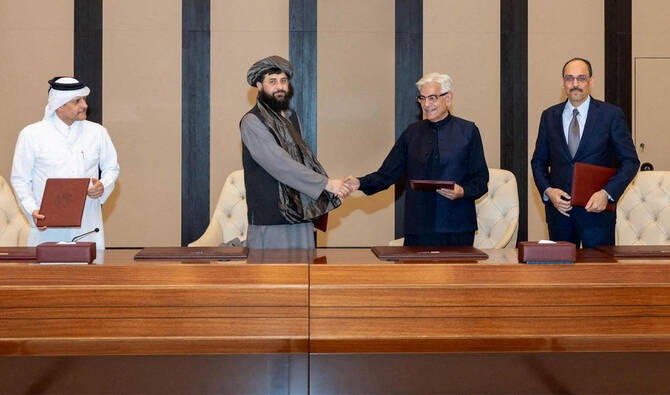Six-Day Negotiations Conclude with Ceasefire Commitment
In a significant diplomatic development, Pakistan and the Afghan Taliban have agreed to maintain the existing ceasefire and create a new framework for cooperation following six days of high-level talks held in Istanbul, Turkey.
The negotiations, which at times faced tense moments and brief deadlocks, concluded with a joint declaration emphasizing the continuation of the ceasefire and the need for effective counter-terrorism measures. The talks were mediated by Turkey and Qatar, whose efforts were praised for steering the discussions toward a positive outcome.
According to the joint statement, both sides will meet again on 6 November in Istanbul to finalize implementation details and develop a structured mechanism for ongoing dialogue.
Pakistan’s Concerns Over Cross-Border Attacks
A central issue during the negotiations was Pakistan’s demand that Afghan territory must not be used for terrorist activities targeting Pakistan. Islamabad has repeatedly accused militant groups operating from Afghanistan of launching attacks across the border, particularly the Tehrik-i-Taliban Pakistan (TTP) and the Balochistan Liberation Army (BLA).
For a deeper understanding of the historical roots of these hostilities and the recurring clashes along the border, readers can explore Why Afghanistan and Pakistan Are Fighting: Understanding the Border Tensions. The Pakistani representatives maintained a firm stance that national sovereignty and border security were non-negotiable principles in any peace arrangement.
Agreement on Monitoring and Verification Mechanism
One of the key outcomes of the Istanbul talks was an interim mutual understanding under which both parties agreed to continue the ceasefire, provided no attacks against Pakistan originate from Afghan soil.
To ensure compliance, both sides will establish a joint monitoring and verification mechanism tasked with overseeing the implementation of the ceasefire and investigating any violations. The mechanism will also have the authority to propose corrective measures or penalties in the event of breaches.
This development marks the first time both sides have formally agreed to a structured system for accountability and monitoring, signaling a shift from ad hoc security communications to institutionalized engagement.
Role of Mediators: Turkey and Qatar
Turkey and Qatar played a pivotal role as mediators, hosting and facilitating the talks amid growing concerns over regional security. Both nations commended Pakistan and the Afghan Taliban for their commitment to dialogue and mutual trust-building.
In a joint statement, Turkish and Qatari officials reaffirmed their continued support for peace and stability in South Asia, pledging to assist both sides in maintaining open communication channels and preventing future escalations.
Broader Regional Implications
Analysts view the Istanbul negotiations as a potential turning point in Pakistan–Afghanistan relations, which have been strained since the Taliban’s return to power in Kabul in 2021. Repeated cross-border attacks, refugee concerns, and the presence of militant safe havens have hindered diplomatic progress in recent years.
Experts argue that if the agreed mechanisms are implemented effectively, the ceasefire could serve as a model for regional conflict management, potentially easing tensions along the 2,600-kilometre Durand Line that divides the two countries.
According to the United Nations Assistance Mission in Afghanistan (UNAMA), regional instability and militant activity continue to threaten peace efforts. Both countries face immense pressure to prevent their territories from becoming launchpads for extremist operations.
Pakistan Reaffirms Commitment to Peace
The Pakistani leadership has reiterated that while peace remains a strategic priority, the government will not compromise on national security or sovereignty. Officials emphasized that cooperation with Afghanistan must be rooted in mutual respect and non-interference.
In a statement following the talks, senior Pakistani representatives said, Our commitment to peace is unwavering. However, our sovereignty and the safety of our people are not negotiable.
As both sides prepare for the next round of talks in November, observers note that sustained engagement, verification, and regional cooperation will be crucial in determining whether this ceasefire marks a lasting step toward stability or another temporary pause in a decades-long cycle of mistrust and violence.















